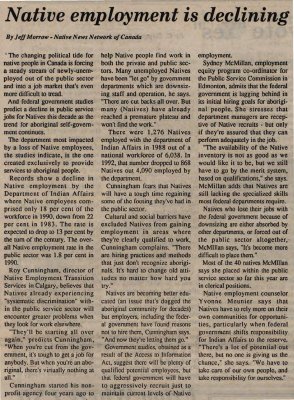"Native employment is declining"
- Publication
- Tekawennake News (Ohsweken, Ontario), 14 Oct 1992
- Full Text
- Native employment is decliningBy Jeff Morrow - Native News Network of Canada
The changing political tide for native people in Canada is forcing a steady stream of newly-unemployed out of the public sector and into a job market that's even more difficult to tread.
And federal government studies predict a decline in public service jobs for Natives this decade as the trend for aboriginal self-government continues.
The department most impacted by a loss of Native employees, the studies indicate, is the one created exclusively to provide services to aboriginal people.
Records show a decline in Native employment by the Department of Indian Affairs where Native employees comprised only 18 per cent of the workforce in 1990, down from 22 per cent in 1983. The rate is expected to drop to 13 per cent by the turn of the century. The overall Native employment rate in the public sector was 1.8 per cent in 1990.
Roy Cunningham, director of Native Employment Transition Services in Calgary, believes that Natives already experiencing "systematic discrimination" within the public service sector will encounter greater problems when they look for work elsewhere.
"They'll be starting all over again," predicts Cunningham, "When you're cut from the government, it's tough to get a job for anybody. But when you're an aboriginal, there's virtually nothing at all."
Cunningham started his non-profit agency four years ago to help Native people find work in both the private and public sectors. Many unemployed Natives have been "let go" by government departments which are downsizing staff and operation, he says. "There are cut backs all over. But many (Natives) have already reached a premature plateau and won't find the work."
There were 1,276 Natives employed with the department of Indian Affairs in 1988 out of a national workforce of 6,038. In 1992, that number dropped to 868 Natives out 4,090 employed by the department.
Cunningham fears that Natives will have a tough time regaining some of the footing they've had in the public sector.
Cultural and social barriers have excluded Natives from gaining employment in areas where they're clearly qualified to work, Cunningham complains. "There are hiring practices and methods that just don't recognize aboriginals. It's hard to change old attitudes no matter how hard you try."
Natives are becoming better educated (an issue that's dogged the aboriginal community for decades) but employers, including the federal government have found reasons not to hire them, Cunningham says. "And now they're letting them go."
Government studies, obtained as a result of the Access to Information Act, suggest there will be plenty of qualified potential employees, but that federal government will have to aggressively recruit just to maintain current levels of Native employment.
Sydney McMillan, employment equity program coordinator for the Public Service Commission in Edmonton, admits that the federal government is lagging behind in its initial hiring goals for aboriginal people. She stresses that department managers are receptive of Native recruits - but only if they're assured that they can perform adequately in the job.
"The availability of the Native inventory is not as good as we would like it to be, but we still have to go by the merit system, based on qualifications," she says. McMillan adds that Natives are still lacking the specialized skills most federal departments require.
Natives who lose their jobs with the federal government because of downsizing are either absorbed by other departments, or forced out of the public sector altogether, McMillan says, "It's become more difficult to place them."
Most of the 40 natives McMillan says she placed within the public service sector so far this year are in clerical positions.
Native employment counselor Yvonne Meunier says that Natives have to rely more on their own communities for opportunities, particularly when federal government shifts responsibility for Indian Affairs to the reserve. "There's a lot of potential out there, but no one is giving us the chance," she says. "We have to take care of our own people, and take responsibility for ourselves."
- Creator
- Morrow, Jeff, Author
- Media Type
- Text
- Newspaper
- Item Type
- Clippings
- Publisher
- Tekawennake News
- Place of Publication
- Six Nations of the Grand River, ON
- Date of Publication
- 14 Oct 1992
- Subject(s)
- Personal Name(s)
- Cunningham, Roy ; McMillian, Sydney ; Meunier, Yvonne.
- Corporate Name(s)
- Department of Indian Affairs ; Native Employment Transition Services ; Public Service Commission
- Local identifier
- SNPL005067v00d
- Language of Item
- English
- Geographic Coverage
-
-
Ontario, Canada
Latitude: 43.06681 Longitude: -80.11635
-
- Creative Commons licence
 [more details]
[more details]- Copyright Statement
- Public domain: Copyright has expired according to Canadian law. No restrictions on use.
- Copyright Date
- 1992
- Copyright Holder
- Tekawennake News
- Contact
- Six Nations Public LibraryEmail:info@snpl.ca
Website:
Agency street/mail address:1679 Chiefswood Rd
PO Box 149
Ohsweken, ON N0A 1M0
519-445-2954



